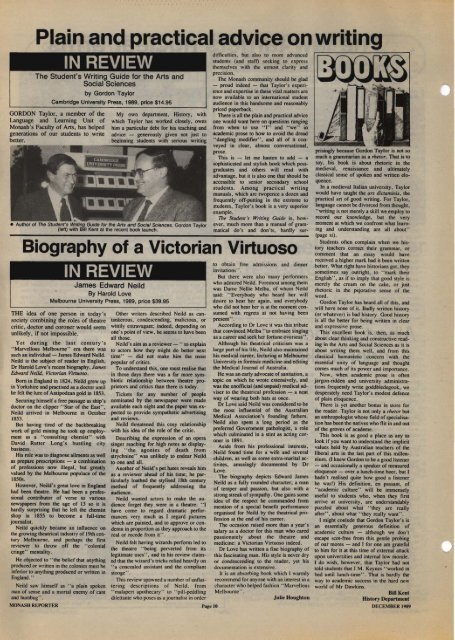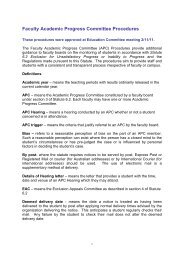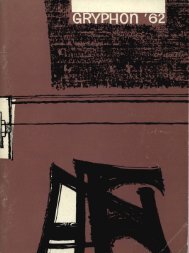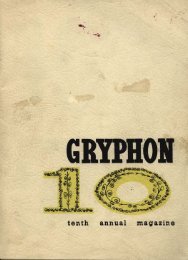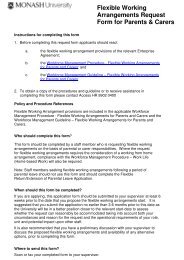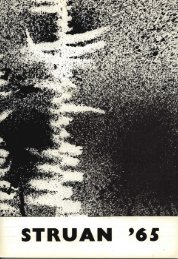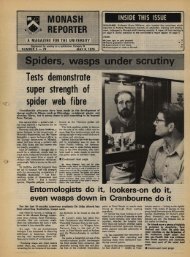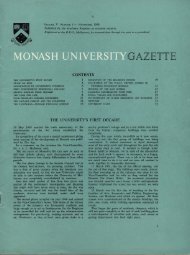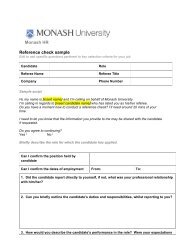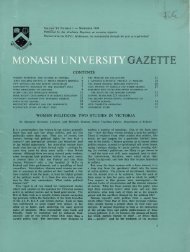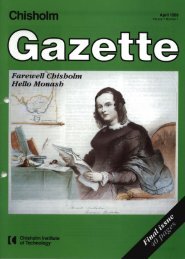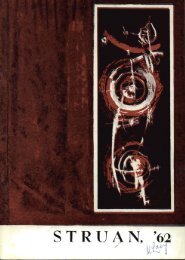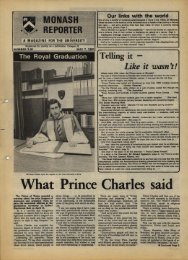Structure of the new university. begins to emerge - Adm.monash.edu ...
Structure of the new university. begins to emerge - Adm.monash.edu ...
Structure of the new university. begins to emerge - Adm.monash.edu ...
Create successful ePaper yourself
Turn your PDF publications into a flip-book with our unique Google optimized e-Paper software.
Plain and practical advice on writing IN REVIEW The Student's Writing Guide for <strong>the</strong> Arts and Social Sciences by Gordon Taylor Cambridge University Press, 1989, price $14.95GORDON Taylor, a member <strong>of</strong> <strong>the</strong> My own department, His<strong>to</strong>ry. withLanguage and Learning Unit <strong>of</strong> which Taylor has worked closely, owesMonash's Faculty <strong>of</strong> Arts, has helped him a particular debt for his teaching andgenerations <strong>of</strong> OUT students <strong>to</strong> write advice - generously given not just <strong>to</strong>beller.beeinning students with serious writing-'~-Biography <strong>of</strong> a Vic<strong>to</strong>rian Virtuoso IN REVIEW James Edward Neild By Harold Love Melbourne University Press, 1989, price $39.95 THE idea <strong>of</strong> one person in <strong>to</strong>day'ssociety combining <strong>the</strong> roles <strong>of</strong> <strong>the</strong>atrecritic, doc<strong>to</strong>r and coroner would seemunlikely, if not impossible.Yet during <strong>the</strong> last century's"Marvellous Melbourne" era <strong>the</strong>re wassuch an individual- James Edward Neild.Neild is <strong>the</strong> subject <strong>of</strong> reader in English,Dr Harold Love's recent biography, JamesEdward Neild. Vic<strong>to</strong>rian Vinuoso.Born in England in 1824, Neild grew upin Yorkshire and practised as a doc<strong>to</strong>r untilhe felt <strong>the</strong> lure <strong>of</strong> Antipodean gold in 1853.Securing himself a free passage as ship'sdoc<strong>to</strong>r on <strong>the</strong> clipper "Star <strong>of</strong> <strong>the</strong> East" ,Neild arrived in Melbourne in Oc<strong>to</strong>ber1853.But having tired <strong>of</strong> <strong>the</strong> backbreakingwork <strong>of</strong> gold mining he <strong>to</strong>ok up employmentas a "consulting chemist" withDavid Rutter Long' s bustling citybusiness.His role was <strong>to</strong> diagnose ailments as wellas prepare prescriptions - a combination<strong>of</strong> pr<strong>of</strong>essions now illegal, but greatlyvalued by <strong>the</strong> Melbourne populace <strong>of</strong> <strong>the</strong>18505.However, Neild's great love in Englandhad been <strong>the</strong>atre. He had been a pr<strong>of</strong>essionalcontribu<strong>to</strong>r <strong>of</strong> verse <strong>to</strong> various<strong>new</strong>spapers from <strong>the</strong> age <strong>of</strong> 13 so it ishardly surprising that he left <strong>the</strong> chemistshop in 1855 <strong>to</strong> become a full-timejournalist.Neild quickly became an influence on<strong>the</strong> growing <strong>the</strong>atrical industry <strong>of</strong> 19th centuryMelbourne, and perhaps <strong>the</strong> firstreviewer <strong>to</strong> throw <strong>of</strong>f <strong>the</strong> "colonialcringe" mentality .He objected <strong>to</strong> "<strong>the</strong> belief that anythingproduced or written in <strong>the</strong> colonies must beinferior <strong>to</strong> anything produced or wrinen inEngland...Neild saw himself as " a plain spokenman <strong>of</strong> sense and a mortal enemy <strong>of</strong> cantand humbug" .MONASH REPORTERO<strong>the</strong>r writers described Neild as cantankerous,condescending, malicious, orwittily extravagant; indeed, depending onone's point <strong>of</strong> view, he seems <strong>to</strong> have beenall those.Neild's aim as a reviewer - " <strong>to</strong> explain<strong>to</strong> ac<strong>to</strong>rs how <strong>the</strong>y might do bener nexttime" - did not make him <strong>the</strong> mostpopular <strong>of</strong> critics.To understand this, one must reaJise thatin those days <strong>the</strong>re was a far more symbioticrelationship between <strong>the</strong>atre proprie<strong>to</strong>rsand critics than <strong>the</strong>re is <strong>to</strong>day.Tickels for any number <strong>of</strong> peoplenominated by <strong>the</strong> <strong>new</strong>spaper were madeavailable each night and <strong>the</strong> paper was expected<strong>to</strong> provide sympa<strong>the</strong>tic advertisingand reviews.Neild threatened this cosy relationshipwith his idea <strong>of</strong> <strong>the</strong> role <strong>of</strong> <strong>the</strong> critic.Describing <strong>the</strong> expression <strong>of</strong> an operasinger reaching for high notes as displaying" <strong>the</strong> agonies <strong>of</strong> death fromstrychnine" was unlikely <strong>to</strong> endear Neild<strong>to</strong> one and all.Ano<strong>the</strong>r <strong>of</strong> Neild's pet hates reveals himas a reviewer ahead <strong>of</strong> his time; he particularlyloa<strong>the</strong>d <strong>the</strong> stylised 18th centurymethod <strong>of</strong> frequently addressing <strong>the</strong>audience.Neild wanted ac<strong>to</strong>rs <strong>to</strong> make <strong>the</strong> audienceforget <strong>the</strong>y were in a <strong>the</strong>atre: "Ihave come <strong>to</strong> regard dramatic performancesvery much as I regard pictureswhich are painted, and <strong>to</strong> approve or condemnin proportion as <strong>the</strong>y approach <strong>to</strong> <strong>the</strong>real or recede from it".Neild felt having wizards perform led <strong>to</strong><strong>the</strong> <strong>the</strong>atre "being perverted from itslegitimate uses", and in his review claimedthat <strong>the</strong> wizard 's tricks relied heavily on" a concealed assislant and <strong>the</strong> complianls<strong>to</strong>oge" .This review spawned a number <strong>of</strong> unflatteringdescriptions <strong>of</strong> Neild . from"malapert apo<strong>the</strong>cary" <strong>to</strong> "pill-peddlingdilettante who poses as ajournalist in orderP~edifficulties, but also <strong>to</strong> more advancedstudents (and staff) seeking <strong>to</strong> express<strong>the</strong>mselves with <strong>the</strong> utmost clarity andprecision.The Monash community should be glad- proud indeed - that Taylor's expericnceand expertise in <strong>the</strong>se vital matters arenow available <strong>to</strong> an international studentaudience in this handsome and reasonablypriced paperback.There is all <strong>the</strong> plain and practical adviceone would want here on questions rangingfrom when <strong>to</strong> use 1'1" and "we" inacademic prose <strong>to</strong> how <strong>to</strong> avoid <strong>the</strong> dread"dangling modifier", and all <strong>of</strong> it con·veyed in clear, almost conversational,prose.This is - let me hasten <strong>to</strong> add - asophisticated and stylish book which postgraduatesand o<strong>the</strong>rs will read withadvantage, but it is also one that should beaccessible <strong>to</strong> senior secondary schoolstudents. Among practical writingmanuals, which are twopence a dozen andfrequently <strong>of</strong>f-putting in <strong>the</strong> extreme <strong>to</strong>students, Taylor's book is a very superiorexample.The Student 's Writing Guide is, however,much more than a manual <strong>of</strong> grammaticaldo's and don 'ts. hardly sur<strong>to</strong>obtain free admissions and dinnerinvitations" .But <strong>the</strong>re were also many performerswho admired Neild . Foremost among <strong>the</strong>mwas Dame Nellie Melba, <strong>of</strong> whom Neildsaid: "Everybody who heard her willdesire <strong>to</strong> hear her again, and everybodywho did not hear her is at <strong>the</strong> moment consumedwith regrets at not having beenpresent" .According <strong>to</strong> Dr Love it was this tributethat convinced Melba "<strong>to</strong> embrace singingas a career and seek her fortune overseas".Although his <strong>the</strong>atrical criticism was alarge part <strong>of</strong> his life, Neild also maintainedhis medical career, lecturing at MelbourneUniversity in forensic medicine and editing<strong>the</strong> Medical Journal <strong>of</strong> Australia.He was an early advocate <strong>of</strong> sanitation, a<strong>to</strong>pic on which he wrote extensively , andwas <strong>the</strong> un<strong>of</strong>ficial (and unpaid) medical adviser<strong>to</strong> <strong>the</strong> <strong>the</strong>atrical pr<strong>of</strong>ession - a neatway <strong>of</strong> wearing both hats at once.Dr Love said Neild was considered 10 be<strong>the</strong> most influential <strong>of</strong> <strong>the</strong> AustralianMedical Association's founding fa<strong>the</strong>rs.Neild also spent a long period as <strong>the</strong>preferred Government pathOlogist, a rolewhich culminated in a stint as acting coronerin 1891.Aside from his pr<strong>of</strong>essional interests,Neild found time for a wife and severalchildren, as well as some extra-marital activites,amusingly documented by DrLove.The biography depicts Edward JamesNeild as a fully rounded character, a man<strong>of</strong> temper and passion, but also with astrong streak <strong>of</strong> sympathy. One gains someidea <strong>of</strong> <strong>the</strong> respect he commanded frommention <strong>of</strong> a special benefit performanceorganised for Neild by <strong>the</strong> <strong>the</strong>atrical pr<strong>of</strong>essionat <strong>the</strong> end <strong>of</strong> his career.The occasion raised more than a year' 5salary as a d~<strong>to</strong>r for this man who caredpassionately about <strong>the</strong> <strong>the</strong>atre andmedicine: a Vic<strong>to</strong>rian Virtuoso indeed .Dr Love has written a fine biography <strong>of</strong>this fascinating man. His style is never dryor condescending <strong>to</strong> <strong>the</strong> reader, yet hisdocumentation is extensive.It is an absorbing book which I warmlyrecommend for anyone with an interest in acharacter who helped fashion " MarvellousMelbourne" .Julie Hough<strong>to</strong>n10I prisingly because Gordon Taylor is not somuch a grammarian as a ~lOr. That is <strong>to</strong>say, his book is about rhe<strong>to</strong>ric in <strong>the</strong>medieval, renaissance and ultimatelyclassical sense <strong>of</strong> spoken and written eloquence.In a medieval Italian universily, Taylorwould have taught <strong>the</strong> ors dk<strong>to</strong>m;nis, <strong>the</strong>practical art <strong>of</strong> good writing. For Taylor.language cannot be divorced from thought," writing is not merely a skill we employ <strong>to</strong>record our knOWledge. but <strong>the</strong> verymoment at which we confront what learningand understanding are all about"(page xi).Students <strong>of</strong>ten complain when we his<strong>to</strong>ryteachers correct <strong>the</strong>ir grammar, orcomment that an essay would havereceived a higher mark had it been writtenbetter. What right have his<strong>to</strong>rians got, <strong>the</strong>ysometimes say outright, <strong>to</strong> "mark <strong>the</strong>irEnglish", as if <strong>to</strong> imply that good style ismerely <strong>the</strong> cream on <strong>the</strong> cake, or justrhe<strong>to</strong>ric in <strong>the</strong> pejorative sense <strong>of</strong> <strong>the</strong>word.Gordon Taylor has heard all <strong>of</strong> this, andwill have none <strong>of</strong> it. Badly written his<strong>to</strong>ry(or whatever) is bad his<strong>to</strong>ry . Good his<strong>to</strong>ryis all <strong>the</strong> better for being written in clearand expressive prose.This excellent book is, <strong>the</strong>n, as muchabout clear thinking and constructive readingin <strong>the</strong> Arts and Social Sciences as it isabout ~riting<strong>the</strong>m well, and from thisclassical humanistic concern with <strong>the</strong>essential unity <strong>of</strong> language and thoughtcomes much <strong>of</strong> its power and importance.Now. when academic prose is <strong>of</strong>tenjargon-ridden and <strong>university</strong> administrationsfrequently write goddbledegook, wedesperately need Taylor's modest defence<strong>of</strong> plain eloquence.There is yet ano<strong>the</strong>r bonus in s<strong>to</strong>re for<strong>the</strong> reader. Taylor is not only a me<strong>to</strong>r butan anthropologist whose field <strong>of</strong> specialisationhas been <strong>the</strong> natives who flit in and out<strong>of</strong> <strong>the</strong> groves <strong>of</strong> academe.This book is as good a place as any <strong>to</strong>look if you want <strong>to</strong> understand <strong>the</strong> implicitvalues held by Australian teachers <strong>of</strong> <strong>the</strong>liberal arts in <strong>the</strong> last part <strong>of</strong> this millennium.(I k<strong>new</strong> Gordon <strong>to</strong> be a good listener- and occasionally a speaker <strong>of</strong> measuredeloquence - over a lunch-time beer, but Ihadn't realised quite how good a listenerhe was!) His definition. en passant, <strong>of</strong>"academic culture" will be immenselyuseful <strong>to</strong> students who. when <strong>the</strong>y firstarrive at <strong>university</strong>, are understandablypuzzled about what " <strong>the</strong>y are reallyafter". about what "<strong>the</strong>y really want".I mighl conlude that Gordon Taylor's isan essentially generous definition <strong>of</strong>academic culture - although we don'tescape scot-free from this gentle probing<strong>of</strong> our mores - and I for one am grateful<strong>to</strong> him for it at this time <strong>of</strong> external attackupon universities and internal low morale.I do wish . however, that Taylor had not<strong>to</strong>ld students that J.M. Keynes "worked inbed until lunch-time". That is hardly <strong>the</strong>way <strong>to</strong> academic success in <strong>the</strong> hard <strong>new</strong>world <strong>of</strong> Mr Dawkins.Bill KentHis<strong>to</strong>ry DepartmentDECEMBER 1989


